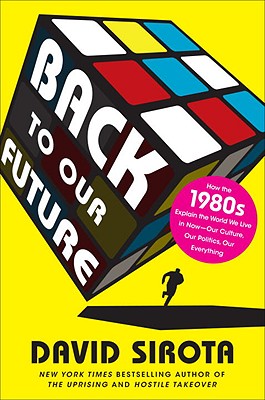
 David Sirota is a political journalist, nationally syndicated weekly newspaper columnist and bestselling author living in Denver, Colorado. As one of the only national columnists living and reporting outside of Washington, D.C., he is widely known for his coverage of political corruption, globalization and working-class economic issues often ignored by both of America's political parties.
David Sirota is a political journalist, nationally syndicated weekly newspaper columnist and bestselling author living in Denver, Colorado. As one of the only national columnists living and reporting outside of Washington, D.C., he is widely known for his coverage of political corruption, globalization and working-class economic issues often ignored by both of America's political parties.Sirota, whose two books (Hostile Takeover and The Uprising) were both New York Times bestsellers, has contributed to The New York Times Magazine and The Nation and hosts the morning talk show on Denver’s Clear Channel affiliate, KKZN-AM760. He is a senior editor at In These Times magazine and Huffington Post contributor, and appears periodically on CNN, MSNBC, Comedy Central’s Colbert Report, Fox News, and National Public Radio.
Now, hereeeeeeeeeeee's David:
Though I host the morning drive-time radio show on Denver’s KKZN-AM760, I am a writer at heart. The printed word is my first (but not only) love, the media instrument that gives us the best music when played by virtuosos. Unfortunately, in the age of bad cable television and worse Twitter/Facebook posts, we have fewer and fewer such gems, especially in the world of non-fiction. This is why now more than ever, we must cherish the great nonfiction scribes we still have - the masters who are willing to break through the red-versus-blue political cliches and tell us about the more nuanced reality we live in.
In 2010, four of the non-fiction arena’s stars gave us genuine masterpieces that looked, respectively, into the worlds of music, business, sports and consumer culture.
 Rock and Roll Will Save Your Life
Rock and Roll Will Save Your LifeOstensibly about underrated bands and the superfans who love them, this book is really about the deeper human condition of hero worship - what it’s about and why it is so powerful in contemporary society. Filled with humor and desperation, author Steve Almond is at his best when he’s admitting what many of us are too afraid to admit: We’ll never be as cool as we think rock stars are, and neither will the rock stars themselves - and that’s OK.
 Griftopia
GriftopiaMix an author with the flare of Hunter S. Thompson, the rage of Sam Kinnison and the linguistic skills of H. L. Mencken, then drop him into the center of the Wall Street meltdown and you get this scathing opus. Making the byzantine world of finance eminently accessible and entertaining is no small task, but Rolling Stone’s Matt Taibbi makes it look easy - and in the process gives us a classic that of both brilliant theater and historical import.
 Bad Sports
Bad SportsAsk a typical sports fan if athletics are political, and they’ll probably say no. But The Nation magazine’s sportswriter Dave Zirin has made a career out of showing just how wrong that misperception is. In his latest book, Zirin aims his microscope at professional sports-team owners, showing how avarice isn’t limited to stock market floors or Wall Street suites - it’s in the stadiums and arenas that play host to our most beloved games
.
 Cheap
Cheap A recession might seem a strange moment to write about the problems with America’s love of low prices. After all, most of us are more strapped for cash than ever, leaving bargains as seemingly the only ray of light in a dark storm. Ellen Ruppel Shell, however, shows that the fetishization of cheap is part of what created that economic turbulence - and much of what’s intensifying that turbulence for the long-haul.
In 2011, I will be adding my third contribution to the non-fiction realm with my new book Back to Our Future: How the 1980s Explain the World We Live in Now--Our Culture, Our Politics, Our Everything. It looks at how 1980s pop culture (movies, TV, video games, sports, commercials, toys, etc.) shape our thinking on the most important issues today. Drawing on my own personal experience as a proud child of the 1980s, the book argues that the resurrection of the 80s in cinema, TV and the larger culture is no fling with nostalgia nor is it a coincidence. It is happening precisely because the 80s zeitgeist is the most powerful force in the ascendant generation’s psyche.
No comments:
Post a Comment